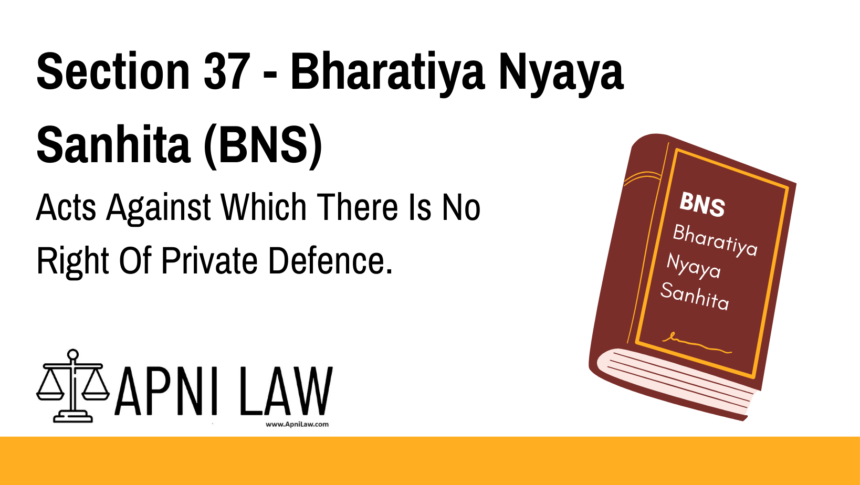Code: Exact Text of Section 37 BNS
Section 37 BNS
(1) There is no right of private defence,––
(a) against an act which does not reasonably cause the apprehension of death
or of grievous hurt, if done, or attempted to be done, by a public servant acting in good
faith under colour of his office, though that act, may not be strictly justifiable by law;
(b) against an act which does not reasonably cause the apprehension of death
or of grievous hurt, if done, or attempted to be done, by the direction of a public
servant acting in good faith under colour of his office, though that direction may not
be strictly justifiable by law;
(c) in cases in which there is time to have recourse to the protection of the public
authorities.
(2) The right of private defence in no case extends to the inflicting of more harm than
it is necessary to inflict for the purpose of defence.
Explanation 1.—A person is not deprived of the right of private defence against an act
done, or attempted to be done, by a public servant, as such, unless he knows or has reason
to believe, that the person doing the act is such public servant.
Explanation 2.—A person is not deprived of the right of private defence against an act
done, or attempted to be done, by the direction of a public servant, unless he knows, or has
reason to believe, that the person doing the act is acting by such direction, or unless such
person states the authority under which he acts, or if he has authority in writing, unless he
produces such authority, if demanded.
Explanation of Section 37 BNS
1. When Does the Right of Private Defence NOT Apply?
This section ensures that individuals cannot misuse self-defence as a justification in certain situations. The key cases where self-defence is not allowed include:
- Minor threats or actions that do not pose serious harm.
- Actions by law enforcement officers performing their duty.
- Legitimate recovery of property (e.g., reclaiming stolen goods legally).
2. Why is This Section Important?
- Prevents misuse of self-defence as an excuse for violent retaliation.
- Protects law enforcement officers acting within their legal powers.
- Ensures that people do not attack others for rightful acts (e.g., a landlord evicting a tenant legally).
Illustrations
Example 1: A Police Officer Arresting Someone
🔹 Scenario: A police officer arrests a suspect following proper legal procedures. The suspect cannot claim private defence and attack the officer to resist arrest.
Example 2: Someone Taking Back Their Own Property
🔹 Scenario: A person legally reclaims their stolen mobile phone from someone who had taken it. The thief cannot claim private defence and fight back.
Example 3: No Right to Self-Defence in a Minor Dispute
🔹 Scenario: A neighbor slightly pushes someone in an argument without causing harm. If the other person punches them in response, it exceeds the right of private defence.
Example 4: Attacking an Officer for Issuing a Fine
🔹 Scenario: A traffic police officer fines someone for breaking a rule. The driver cannot claim private defence if they attack the officer.
Common Questions and Answers on Section 37 BNS
1. Can I use private defence against a police officer?
🚫 No, unless the officer is clearly acting illegally and without authority.
2. What if an officer is using excessive force?
✅ If a police officer uses excessive or illegal force, reasonable self-defence may be justified under other sections.
3. Can I hit someone if they are legally taking back their property?
🚫 No, if they are reclaiming something that legally belongs to them, self-defence does not apply.
4. Can I claim private defence in a minor fight?
🚫 No, if the act does not cause serious harm, self-defence cannot be used as an excuse for retaliation.
5. Does this mean public servants can never be stopped?
✅ No. If a public servant is clearly acting unlawfully, their actions do not fall under this protection, and reasonable defence may be allowed.
Conclusion
Section 37 BNS ensures that the right to private defence is not abused. It prevents people from using self-defence as an excuse to attack public servants, rightful owners, or overreact in minor disputes. However, it does not protect illegal actions by authorities, which means citizens still have protection against abuse of power.
For more legal insights, visit ApniLaw today! 🚀








